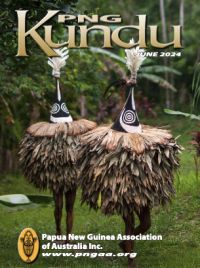VALES & TRIBUTES
BEIL | KENNY | OWEN | REDWOOD |
BEIL, Barry James
14 June 2023
Barry Beil spent 22 years in PNG from 1957 to 1979 and made a significant contribution to its economic development. He had many fond memories of PNG and made many lifelong friends.
Barry was born in Kingaroy on 23 January 1938 and grew up on a farm just outside Kumbia at the foothills of the Bunya Mountains. In 1954 he commenced a three-year Diploma in Agriculture at Gatton Agricultural College. After graduating in February 1957, Barry applied for the position of Assistant Agricultural Officer in the Territory of Papua and New Guinea (as it was then known). A medical examination was required as well as an interview in Brisbane. Both were successful, and he subsequently undertook a three-week training course at the Australian School of Pacific Administration in Sydney before departing for PNG on 4 October 1957.
Barry’s first posting was at Taliligap, then Manam Island and in late 1959 he was transferred to Karkar Island (off Madang) where he worked for the following three years. His role was as an agricultural
extension officer (didiman) with the local people, who were being encouraged to develop a cash economy by expanding cocoa and coconut plantings.
From 1962 to 1968 Barry was posted to the Marketing Section of Headquarters at Konedobu in Port Moresby. During this time, he married Beverly Seeto. In 1969 Barry was posted to Mount Hagen as District Rural Development Officer in charge of the Western Highlands with responsibilities for coffee, tea, pyrethrum and cattle. In February 1971, Barry was promoted to the position of Executive Officer of the PNG Coffee Marketing Board. He oversaw the stable governance, operation and significant growth
of the PNG coffee industry in becoming one of PNG’s largest export earners.
The industry provided work and income for hundreds of thousands of local small farmers as well as larger plantation owners. It raised their standard of living and contributed immensely to the economy of PNG. He remained in this position until late 1979 when he and his family moved back to Australia to settle in the Redlands area in Queensland where he ‘semi-retired as a small crops farmer.
Stuart Bell
KENNY, Michael James Anthony
19 April 2023
It was 1950 in Misima when Madge Free, a tall, dark-haired British beauty with a calm authority and extensive nursing background met the devilishly handsome and equally cheeky Irishman James (Jim) Kenny.
Madge had been sent to Misima to assist European Medical Assistant (EMA) Jim Kenny cope with the 1950 polio epidemic. They married that year and moved to Abau. It was in Abau on 8 June 1951 that my father was born. As a young child he accompanied his parents on their postings until old enough to be
sent to school in Australia. Dad had a traumatic and tumultuous time at a Sydney boarding school, missing his parents and his much-loved island home ter r ibly. He eventually ran away in about Year Nine and began his many adventures on the road, following his gypsy, or perhaps orphaned, heart.
Dad had a passion for planes and f lying and worked with Qantas for many years, travelling the world having what always sounded like an absolute skite of a time. He later worked in propeller engineering and various other trades. He was a man of much knowledge and charm, with the ability to have a good yarn.
Dad was the type of guy that would chat to any stranger, hold court wherever he sat with a beer and listening ear. When we were young kids, he was known to bring back carloads of new ‘friends’ from any pub he frequented (much to my mother’s blight). His life experience, coupled with his wit and topped with his mischievous personality, meant he was electric to be around and one heck of a storyteller.
As age, and a predominately debaucherous life finally caught up with him, the storytelling settled into writing, poems mostly, and eventually his life story. ‘You can take the boy out of PNG, but you can’t take
the PNG out of the boy’ rang unequivocally true for Dad. His heart was, and always will be, in Abau. We hope, one day, to go there to scatter his ashes, so he can finally be at peace at his home.
Michael is survived by his children Shaun and Rori, and his grandchildren Scarlett, Remy, Arlo, Lola and Niko.
Rori Bicer
OWEN, Ifor Lunt
24 November 2022
Ifor was born in Penybontfaw a small village in Montgomeryshire, Wales. After his primary education
there, he went to Llanfyllin for high school, and then on to Aberystwyth College of Wales where he graduated in Zoology. His interest in the subject led him to a postgraduate degree (PhD) at Aberystwyth
on the parasites of fish with Gwendolyn Rees. This led to his appointment as assistant lecturer in Parasitology at the Royal Veterinary College in London, then to a lectureship at the Chelsea College of Science and Technology, University of London.
In the 1960s Ifor applied successfully for a two-year Research Fellowship funded by the Australian Government to work in Papua New Guinea. After the completion of the Fellowship, he stayed on for
another forty years, first as Parasitologist and later Senior Veterinary Parasitologist at the National Veterinary Laboratory (NVL) in Port Moresby. His life in PNG was an adventurous one, as he would have to travel to remote areas by small plane and/ or by canoe into the interior with several interpreters because ofbthe numerous languages spokenb(his native Welsh was of limitedbuse in PNG).
During his tenure at the NVL, Ifor performed diagnostic andbresearch work in parasitology, by training and instructing staff, and advising senior departmental staff on the effects of parasites on animal health
and production. During this period, he published many papers on parasites affecting domestic animals in PNG.
From 1990 to 1993 he was Acting Officer- In-Charge of the NVL. This involved maintaining overall
supervision of all sections of the laboratory. Ifor retired from his government post in 1994.Retirement did not alter Ifor’s level of activity and, if anything, provided the opportunity to increase his scientific output
given that over half of his 36 scientific papers were published after 1994. Collectively, these papers contributed much to the current knowledge of the parasite fauna of PNG.
The activities in this phase of his career were completed s an unpaid ‘volunteer’ often using his own personal funds. In addition, Ifor continued to provide a diagnostic service in PNG through daily visits to
the NVL. During this time, he was also a part-time lecturer in Parasitology at the School of
Medicine and Health Sciences, University of Papua New Guinea. The work that provides one of the best examples of Ifor’s dedication to parasitology was associated with his discovery of a new nematode, Trichinella papuae, which affects both pigs and people, a project involving significant hardship in one of
the most remote parts of the country along the PNG/West Papua border. This feat would be a challenge for a young enthusiastic person. The fact that Ifor organised, funded and completed these surveys in his
70s is testament to his dedication to parasitology research.
Ifor continued his association with the NVL into his 80s, working to ensure that the veterinary laboratory had resource material that was up to date and country-specific to use as a reference for the training of future generations of parasitologists. He produced a unique manual for the NVL technicians that includes his many hand-drawn images.
In 2015, Ifor was elected as an Honorary member of the World Association for the Advancement of Veterinary Parasitology. After 42 years in PNG, Ifor returned to Wales to live in a retirement village at Llandudno. Whi le Ifor would have resolutely refused to allow his colleagues to submit any nominations for awards in recognition of his work for PNG, we are sure that he would have approved of the posthumous plan to name the renovated parasitology laboratory at the NVL in his honour, as a mark of
his contribution to the country.
Simon Reid & Ian Beveridge
(Republished with permission of Australian Society for Papraisitology)
REDWOOD, Anthony Leo (Tony)
28 April 2023
Anthony, born on 4 January 1935, completed high school at St Joseph’s College, Gregory Terrace,
Brisbane and then started his adventures as a patrol officer in Papua New Guinea serving in the Eastern Highlands, Central and Sepik Districts and in Bougainville.
This was an incredible experience for a young man and he saw his mates on every subsequent visit to Australia; men who shared a kindred spirit. He met Mary Mollie Redwood on a cruise to Hong Kong when she was travelling around the world as a registered nurse. They were married three months later
and began their new life together in Papua New Guinea. He continued his education, receiving a Diploma of Public Administration (1964), a Bachelor of Economics (1965) and a Bachelor of Commerce (1968) from the University of QLD.
He then changed to a career in economics in the Papua New Guinea Department of Labour.
After having three girls – Karen, Michelle and Fiona – Mollie and Tony moved to the United States where Tony earned his Masters in Labour and Employment Relations and PhD in Economics from the University of Illinois.
His first position was as an Assistant Professor at the University of Kansas (KU). There was a short break from 1974 to 1976 when he took a position as Assistant Secretary Manpower and Economic Policy in the Australian Government and the fami ly moved to Melbourne. Then he returned to KU until his retirement in 1999 as Professor of Business Economics Emeritus.
Among his proudest achievements were his teaching teaching awards, the economic development strategy for the state of Kansas developed with his colleague Charles Krider, service on the KU Athletic
Board and being selected Kansan of the year (inaugural award) by Kansas magazine in 1986.
He had a lifetime joy of sports. In high school he played multiple sports, he refereed rugby in Papua New Guinea, he ran with the Mad Dogs and he was a lifetime golfer. He was also proud of completing the KU
marathon in under four hours in 1976.
After retiring from KU, Tony and Mollie moved to Eagle Creek Country Club in Naples FL and he began another career as a Federal Arbitrator. He retired in 2019 and received notification that none of his 150+ cases had been challenged.
Tony was truly Australian in his love for his mates and how he valued friendship. Geography had no bounds on his Friday night get-togethers whether it was in Lawrence with other professors, book club in Naples with his golf buddies or with his new friends in California at a local craft brewery. He was a great storyteller, whether it was seeing Bill Clinton at Saint Andrews, or just picking up the grandkids from school, there was always a story and laughter to share.
In 2020, thanks to COVID, Tony and Mollie were finally enticed to move to California to live with Karen, Fiona and the grandkids. The last three years of his life were all about family and friends celebrating special times like Bryanna’s graduation from Macalester College, playing golf with Karen and McKenna,
wine tasting with friends and local travel.
In addition to Mollie he leaves his sister, Denise Redwood, his daughters Karen, Michelle Davis and Fiona and grandchildren Bryanna Davis, McKenna Redwood and Mason Redwood. He joins his beloved grandson Nathan Davis in heaven.
This vale was abstracted from an obituary published on:
https://www2.ljworld.com/lifeevents/obituaries/2023/may/19/anthony-redwood/



